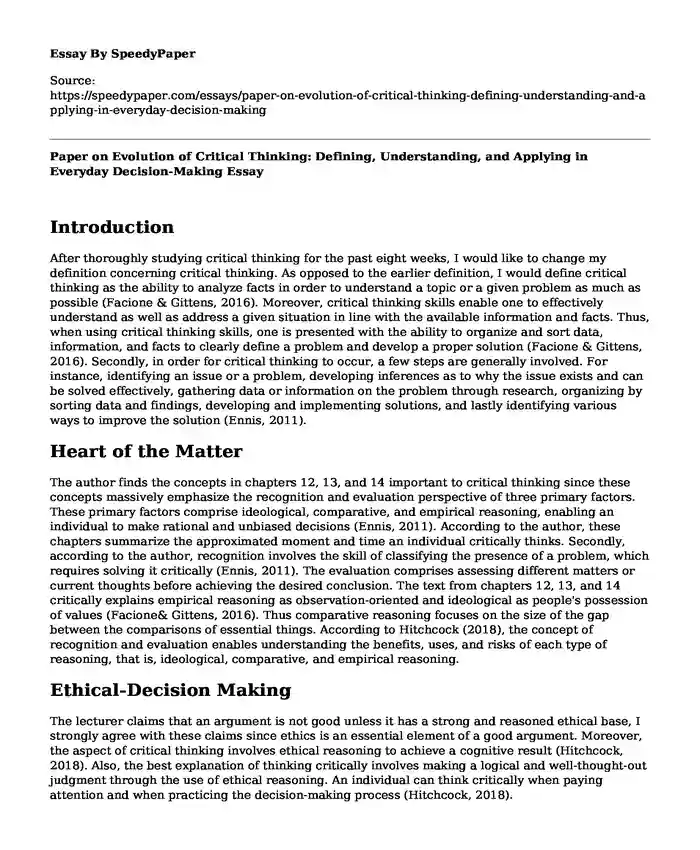
| Essay type: | Definition essays |
| Categories: | Ethics Cognitive development |
| Pages: | 3 |
| Wordcount: | 560 words |
Introduction
After thoroughly studying critical thinking for the past eight weeks, I would like to change my definition concerning critical thinking. As opposed to the earlier definition, I would define critical thinking as the ability to analyze facts in order to understand a topic or a given problem as much as possible (Facione & Gittens, 2016). Moreover, critical thinking skills enable one to effectively understand as well as address a given situation in line with the available information and facts. Thus, when using critical thinking skills, one is presented with the ability to organize and sort data, information, and facts to clearly define a problem and develop a proper solution (Facione & Gittens, 2016). Secondly, in order for critical thinking to occur, a few steps are generally involved. For instance, identifying an issue or a problem, developing inferences as to why the issue exists and can be solved effectively, gathering data or information on the problem through research, organizing by sorting data and findings, developing and implementing solutions, and lastly identifying various ways to improve the solution (Ennis, 2011).
Heart of the Matter
The author finds the concepts in chapters 12, 13, and 14 important to critical thinking since these concepts massively emphasize the recognition and evaluation perspective of three primary factors. These primary factors comprise ideological, comparative, and empirical reasoning, enabling an individual to make rational and unbiased decisions (Ennis, 2011). According to the author, these chapters summarize the approximated moment and time an individual critically thinks. Secondly, according to the author, recognition involves the skill of classifying the presence of a problem, which requires solving it critically (Ennis, 2011). The evaluation comprises assessing different matters or current thoughts before achieving the desired conclusion. The text from chapters 12, 13, and 14 critically explains empirical reasoning as observation-oriented and ideological as people's possession of values (Facione& Gittens, 2016). Thus comparative reasoning focuses on the size of the gap between the comparisons of essential things. According to Hitchcock (2018), the concept of recognition and evaluation enables understanding the benefits, uses, and risks of each type of reasoning, that is, ideological, comparative, and empirical reasoning.
Ethical-Decision Making
The lecturer claims that an argument is not good unless it has a strong and reasoned ethical base, I strongly agree with these claims since ethics is an essential element of a good argument. Moreover, the aspect of critical thinking involves ethical reasoning to achieve a cognitive result (Hitchcock, 2018). Also, the best explanation of thinking critically involves making a logical and well-thought-out judgment through the use of ethical reasoning. An individual can think critically when paying attention and when practicing the decision-making process (Hitchcock, 2018).
Looking-Forward
After learning critical thinking for the past eight weeks, I strongly believe that I now know everything I need to know concerning critical thinking as a subject. Moreover, I'm now convinced by a single definition of critical thinking, unlike before. I have also learned the various key steps involved in critical thinking, for instance, from identifying an issue or problem to identifying various ways to improve the solution. Also, in order to think critically, I have since mastered the three primary factors that can enable an individual to make rational and unbiased decisions. In a nutshell, I have learned that the aspect of critical thinking involves ethical reasoning to achieve a cognitive result.
References
Facione, P., & Gittens, C. A. (2016). Think critically. Pearson.
Hitchcock, D. (2018). Critical thinking.
Ennis, R. (2011). Critical thinking.
Cite this page
Paper on Evolution of Critical Thinking: Defining, Understanding, and Applying in Everyday Decision-Making. (2023, Nov 14). Retrieved from https://speedypaper.net/essays/paper-on-evolution-of-critical-thinking-defining-understanding-and-applying-in-everyday-decision-making
Request Removal
If you are the original author of this essay and no longer wish to have it published on the SpeedyPaper website, please click below to request its removal:
- Free Essay on Development Psychology Research
- Free Essay on Decreasing Depression in Adolescents
- Shame and I Became Her Target - Essays Analysis Example
- Paper Example. Personality Assessment
- How have you or your perspective changed since the first week of class? Free Essay
- Essay Sample on The Importance of Reading
- Significant Learning Experience (SLE) - Free Essay Example
Popular categories




